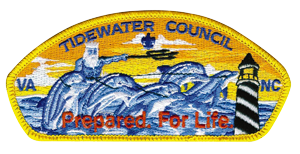From the Scout executive
From the Scout executive, Bill Deany, reviewed May 19, 2015
The Tidewater Council’s first concern is for the safety of all youth and individuals that are involved in the Scouting program. During this time of the year, we normally issue a Deer Tick warning. This includes making sure that individuals within your unit can recognize what a deer tick looks like, what things you can do to prevent bites, and what to do if you do discover the telltale signs of infection (bulls eye red rash).
Here is a great resource on ticks: http://www.cdc.gov/ticks/diseases/ provided by the Center for Disease Control
The following web site is referenced by the Scouting Magazine site: http://www.scoutingmagazine.org/issues/0309/a-tick.html
What is the council doing to help lesson the chance of getting ticks?
For several years the council has undertaken a very successful program to reduce the tick population and other nuisance insects such as chiggers and mosquitoes by spraying campsites, the fields, and the areas that are normally traversed. This program includes spraying and broadcast spreading.
Additionally, we encourage individuals to use the chemical Deet. As a parent or as an adult, you should study the use of Deet or other potential insect/bug repellents. Different official authorities over the years have recommended different percentage levels of Deet for different individuals. Please read those labels carefully.
The council conducts an aggressive spraying program. The council repeats the spraying to ensure overlapping applications. Normally, one spraying will “knock” the tick population down to acceptable levels.
We will also consult with experts and determine if any additional measures are needed.
We also need to point out additional facts about ticks. If you look on a map provided by CDC (Center for Disease Control) you will find that the instances of getting Lyme Disease in our area is minimal to non-existent. However, that does not mean one cannot get it.
Before you go camping, one should ask the owners of the property about ticks and whether in fact they do spray or treat for ticks. We have found through our own efforts that most camping areas do not spray and that the Pipsico Scout Reservation being in an area where the instances are small combined with a spraying program has helped to reduce our risks even greater.
No matter where you go, if you at least read through these materials and better prepare yourself, you will be naturally much safer than not doing anything.
Please note we have also included a portion from the Guide to Safe Scouting that talks about serious injuries. Just as important as it is to prepare yourself for potential situations, one must know what to do if a situation occurs and who one should report the situation to. It’s important to have a council response and not individual responses, because as a council we are a team, as individuals, we are but one person.
Below is additional information.
Note this section from the Boy Scout Field Book:
Tick Bites
Ticks are small bloodsucking arthropods that bury their heads in the flesh of their hosts. Protect yourself whenever you are in tick-infested woodlands and fields by wearing long pants and a long-sleeved shirt with snug cuffs and collar. Button your collar and tuck the cuffs of your pants into your boots or socks. Inspect yourself and other group members daily, especially the hairy parts of the body, and immediately remove any ticks you find.
If a tick has attached itself, grasp it with tweezers close to the skin and gently pull until it comes loose. Don’t squeeze, twist, or jerk the tick, as that might leave its mouthparts in the skin. Wash the wound with soap and water, and apply antibiotic ointment. After dealing with a tick, thoroughly wash your hands. If a tick has been embedded more than a day or poses difficulties in removal, see a physician.
Lyme disease is an illness carried by some ticks. A red ringlike rash might appear around the bite. A victim might feel lethargic and have flulike symptoms, fever, a sore throat, and muscle aches. Anyone experiencing these symptoms in the days and weeks following a trek adventure, especially activities in areas where ticks are known to carry Lyme disease, should be checked by a physician.
Reporting Deaths or Serious Injury
The following procedures apply to adult leadership at the scene of a serious injury or fatality.
Most important, first care for the injured and prevent further injuries. Call 911 for help and begin providing first aid. If the accident occurs at camp, immediately notify the Camp Director or Camp Ranger. If the accident occurs at a location other than a council camp, notify the unit leader or other adult leadership. If the injury is life-threatening, call 911 first.
Adult leaders are responsible for informing their council Scout executive or designee of a death or serious injury or illness as soon as possible. A serious injury or illness is defined as:
- Any period of unconsciousness;
- Any hospital inpatient admission; or
- Any surgical intervention beyond suturing skin or setting simple fractures.
Leaders should be prepared to give specific facts regarding:
| Who? | Name and age of subject, age, and name and complete address of parent(s) or next of kin |
| When? | Date, time of day |
| Where? | Location and community |
| What? | Nature of illness or accident |
| How? | Illness/accident details, if known (e.g., swimming, boating, hiking) |
Prompt and accurate reporting to the news media is most important. The local council has a crisis communications plan, and the Scout executive will designate one spokesperson in order to avoid conflicting reports. Parents or next of kin will be informed by personal contact before any release is made to the public.
Once proper authorities, parents and Scouting officials have been notified, the adult leadership should gather factual information at the scene, including statements of witnesses, leaders and members of the group. These reports can be supported by photographs and/or diagrams.
Non-serious injuries need not be reported to the council office. However, it is recommended that reports of such incidents be prepared and maintained by the unit for future reference.
All council and district Scouters should report to the Scout executive upon learning of serious illnesses or problems. The Scout executive will the necessary actions.
The Scout executive can be reached through the council office at: 757-497-2688 or via his cell phone at: 757-685-5303.

